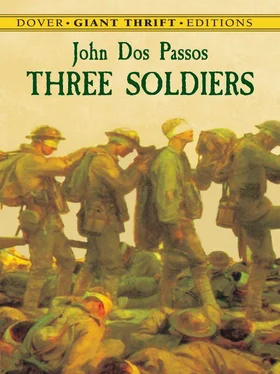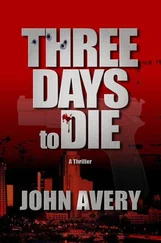“An’ the first thing I thought of when I woke up was how those goddam helmets looked. It upsets a feller to think of a thing like that.” His voice ended in a whine like the broken voice of a child that has been beaten.
“You need to pull yourself together, kid,” said his friend.
“I know what I need, Tub. I need a woman.”
“You know where you get one?” asked Meadville. “I’d like to get me a nice little French girl a rainy night like this.”
“It must be a hell of a ways to the town… They say it’s full of M. P.’s too,” said Fuselli.
“I know a way,” said the man with the nervous voice, “Come on; Tub.”
“No, I’ve had enough of these goddam frog women.”
They all left the canteen.
As the two men went off down the side of the building, Fuselli heard the nervous twitching voice through the metallic patter of the rain:
“I can’t find no way of forgettin’ how funny those guys’ helmets looked all round the lamp… I can’t find no way… ”
* * *
Bill Grey and Fuselli pooled their blankets and slept together. They lay on the hard floor of the tent very close to each other, listening to the rain pattering endlessly on the drenched canvas that slanted above their heads.
“Hell, Bill, I’m gettin’ pneumonia,” said Fuselli, clearing his nose.
“That’s the only thing that scares me in the whole goddam business. I’d hate to die o’ sickness… an’ they say another kid’s kicked off with that-what d’they call it? — menegitis.”
“Was that what was the matter with Stein?”
“The corporal won’t say.”
“Ole Corp. looks sort o’ sick himself,” said Fuselli.
“It’s this rotten climate,” whispered Bill Grey, in the middle of a fit of coughing.
“For cat’s sake quit that coughin’. Let a feller sleep,” came a voice from the other side of the tent.
“Go an’ get a room in a hotel if you don’t like it.”
“That’s it, Bill, tell him where to get off.”
“If you fellers don’t quit yellin’, I’ll put the whole blame lot of you on K. P.,” came the sergeant’s good-natured voice. “Don’t you know that taps has blown?”
The tent was silent except for the fast patter of the rain and Bill Grey’s coughing.
“That sergeant gives me a pain in the neck,” muttered Bill Grey peevishly, when his coughing had stopped, wriggling about under the blankets.
After a while Fuselli said in a very low voice, so that no one but his friend should hear:
“Say, Bill, ain’t it different from what we thought it was going to be?”
“Yare.”
“I mean fellers don’t seem to think about beatin’ the Huns at all, they’re so busy crabbin’ on everything.”
“It’s the guys higher up that does the thinkin’,” said Grey grandiloquently.
“Hell, but I thought it’d be excitin’ like in the movies.”
“I guess that was a lot o’ talk.”
“Maybe.”
Fuselli went to sleep on the hard floor, feeling the comfortable warmth of Grey’s body along the side of him, hearing the endless, monotonous patter of the rain on the drenched canvas above his head. He tried to stay awake a minute to remember what Mabe looked like, but sleep closed down on him suddenly.
The bugle wrenched them out of their blankets before it was light. It was not raining. The air was raw and full of white mist that was cold as snow against their faces still warm from sleep. The corporal called the roll, lighting matches to read the list. When he dismissed the formation the sergeant’s voice was heard from the tent, where he still lay rolled in his blankets.
“Say, Corp, go an’ tell Fuselli to straighten out Lieutenant Stanford’s room at eight sharp in Officers’ Barracks. Number Four.”
“Did you hear, Fuselli?”
“All right,” said Fuselli. His blood boiled up suddenly. This was the first time he’d had to do servants’ work. He hadn’t joined the army to be a slavey to any damned first loot. It was against army regulations anyway. He’d go and kick. He wasn’t going to be a slavey… He walked towards the door of the tent, thinking what he’d say to the sergeant. But he noticed the corporal coughing into his handkerchief with an expression of pain on his face. He turned and strolled away. It would get him in wrong if he started kicking like that. Much better shut his mouth and put up with it. The poor old corp couldn’t last long at this rate. No, it wouldn’t do to get in wrong.
At eight, Fuselli, with a broom in his hand, feeling dull fury pounding and fluttering within him, knocked on the unpainted board door.
“Who’s that?”
“To clean the room, sir,” said Fuselli.
“Come back in about twenty minutes,” came the voice of the lieutenant.
“All right, sir.”
Fuselli leaned against the back of the barracks and smoked a cigarette. The air stung his hands as if they had been scraped by a nutmeg-grater. Twenty minutes passed slowly. Despair seized hold of him. He was so far from anyone who cared about him, so lost in the vast machine. He was telling himself that he’d never get on, would never get up where he could show what he was good for. He felt as if he were in a treadmill. Day after day it would be like this, — the same routine, the same helplessness. He looked at his watch. Twenty-five minutes had passed. He picked up his broom and moved round to the lieutenant’s room.
“Come in,” said the lieutenant carelessly. He was in his shirt-sleeves, shaving. A pleasant smell of shaving soap filled the dark clapboard room, which had no furniture but three cots and some officers’ trunks. He was a red-faced young man with flabby cheeks and dark straight eyebrows. He had taken command of the company only a day or two before.
“Looks like a decent feller,” thought Fuselli.
“What’s your name?” asked the lieutenant, speaking into the small nickel mirror, while he ran the safety razor obliquely across his throat. He stuttered a little. To Fuselli he seemed to speak like an Englishman.
“Fuselli.”
“Italian parentage, I presume?”
“Yes,” said Fuselli sullenly, dragging one of the cots away from the wall.
“Parla Italiano?”
“You mean, do I speak Eyetalian? Naw, sir,” said Fuselli emphatically, “I was born in Frisco.”
“Indeed? But get me some more water, will you, please?”
When Fuselli came back, he stood with his broom between his knees, blowing on his hands that were blue and stiff from carrying the heavy bucket. The lieutenant was dressed and was hooking the top hook of the uniform carefully. The collar made a red mark on his pink throat.
“All right; when you’re through, report back to the Company.” The lieutenant went out, drawing on a pair of khaki-colored gloves with a satisfied and important gesture.
Fuselli walked back slowly to the tents where the Company was quartered, looking about him at the long lines of barracks, gaunt and dripping in the mist, at the big tin sheds of the cook shacks where the cooks and K. P.’s in greasy blue denims were slouching about amid a steam of cooking food.
Something of the gesture with which the lieutenant drew on his gloves caught in the mind of Fuselli. He had seen people make gestures like that in the movies, stout dignified people in evening suits. The president of the Company that owned the optical goods store, where he had worked, at home in Frisco, had had something of that gesture about him.
And he pictured himself drawing on a pair of gloves that way, importantly, finger by finger, with a little wave of self-satisfaction when the gesture was completed… He’d have to get that corporalship.
The company sang lustily as it splashed through the mud down a grey road between high fences covered with great tangles of barbed wire, above which peeked the ends of warehouses and the chimneys of factories.
Читать дальше












